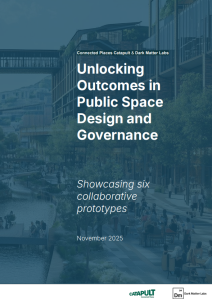Unlocking outcomes in public space design and governance
File type: pdf
File size: 162.48Mb

Public spaces are the heart of urban life, playing a vital role in fostering social cohesion, promoting community well-being, and addressing environmental challenges. However, poor decision-making in the planning, design, and stewardship of these spaces often results in missed opportunities for environmental sustainability and social equity. From insufficient community engagement to the lack of long-term ecological planning, traditional urban development models fall short of creating truly resilient and inclusive spaces. Tackling these challenges requires a comprehensive, outcomes-based approach that integrates both ecological health and community priorities.
Fragmented decision-making, power imbalances, and low trust between stakeholders have long been barriers to effective public space development. The complexity of balancing ecological considerations—such as climate resilience and biodiversity—with community-driven priorities, and planning/ developmental requirements makes the process even more challenging. Poor decisions can lead to social and environmental ecosystems that fail to provide essential services like urban cooling, flood mitigation, or improved air quality. Addressing these issues requires tools that foster collaboration, transparency, and data-driven decision-making to ensure long-term value creation.
As part of this project, Connected Places Catapult and Dark Matter Labs wanted to explore whether digital tools can help bridge the gap by enabling a more inclusive, transparent, and resilient approach to public space development. These tools must not only integrate community input but also statutory requirements, and developer goals alongside considering the requirements of our non-human neighbours.
To test this approach, we organised a hackathon that brought together over 50 participants — including designers, developers, community members, and local authorities — to co-create practical solutions. Over the course of the event, teams developed three key prototypes: the Habitats Recommendation Tool, Public Space Outcomes Dashboard, and Public Space Activation Tool, each addressing different aspects of public space design and management.

Unlocking outcomes in public space design and governance
File type: pdf
File size: 162.48Mb
The hackathon produced six prototype solutions, out of which we’re showcasing three here:
Wiff Waff: A digital tool that translates community inputs into actionable design briefs, helping developers understand community needs and associated value.
Urban Habitat Planner: A digital tool that assists local authorities in making informed decisions on habitat creation and species selection in urban environments. The tool integrates geospatial data, policy layers, and ecological considerations to recommend the best plant species for specific urban sites.
Steward Your Community Spaces: A digital platform that connects community groups to underutilised spaces, streamlining permissions, liability management, and governance. The platform also provides real-time sustainability data, which feeds into council planning systems. Space owners are incentivised to open up their spaces, increasing the likelihood of receiving future development investments. Prototype 1 and prototype 2 focus on the entry point for community groups and event organisers, whereas prototype 3 and prototype 4 focus on the entry point for space owners.
These prototypes represent a shift towards outcomes-driven planning. For more information and access to all six prototypes, check out the full report here.
Interested in shaping the future of public space? Get in touch and join us in making public spaces more inclusive, resilient, and community-focused.

